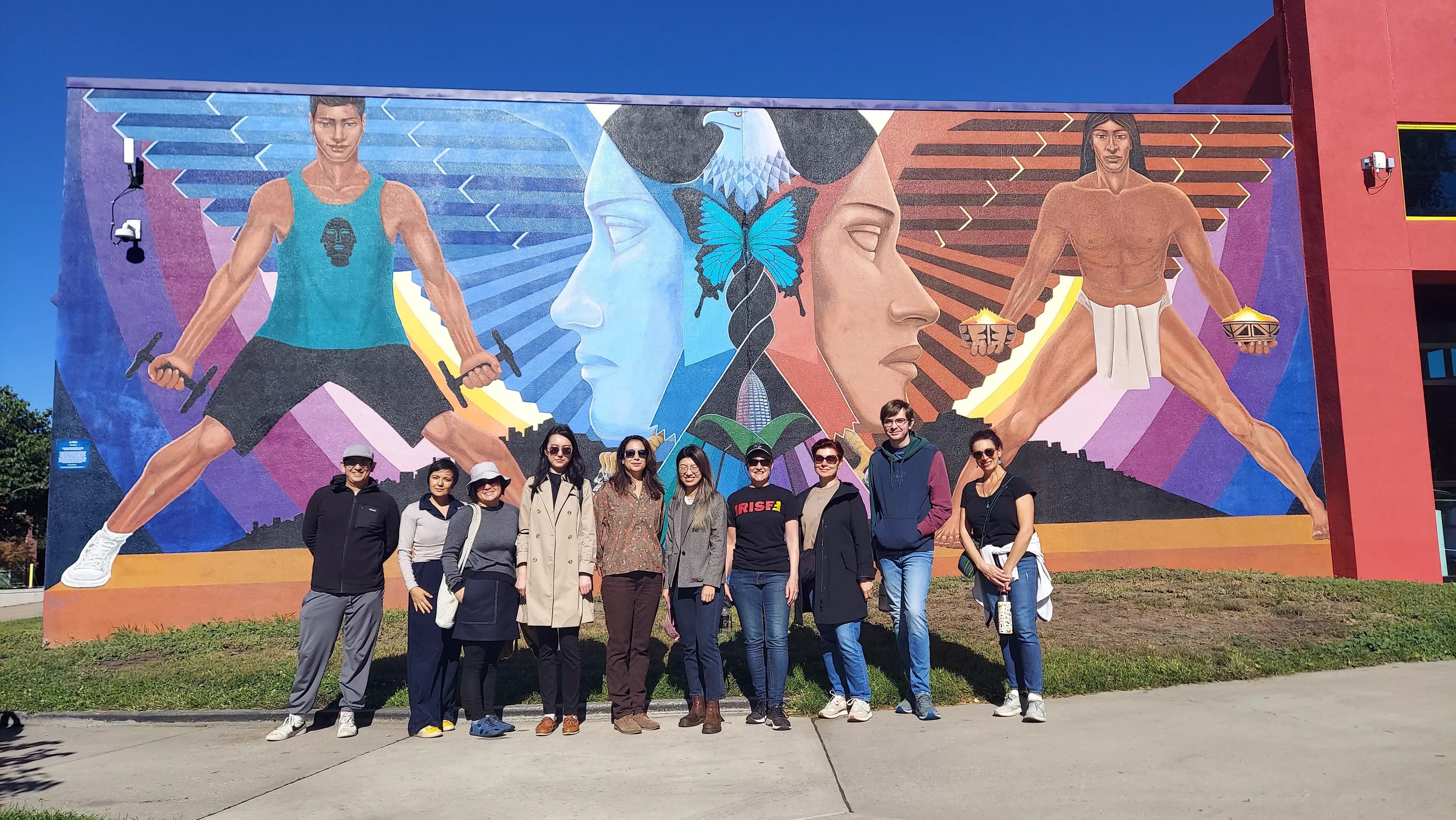
courtesy Tom. Romero

Audio By Carbonatix
When Marie Berry heard that she’d received the National Science Foundation’s CAREER grant in 2021, she says she was “stunned and thrilled.” Berry, who directs the Sié Chéou-Kang Center for International Security & Diplomacy at the University of Denver, had applied for the grant in 2020 amid the nationwide racial justice protests. The fraught political landscape made her proposal to research women- and queer-led social movements feel particularly timely.
“The fact that the NSF invested in it, to me, was a sign that our field recognized the urgency of understanding all of the ways people are working to protect human lives, democracy and our planet,” Berry says.
Awarded by then-President Joe Biden, the prestigious $486,000 grant was intended to fund a five-year program with the Inclusive Global Leadership Initiative to research anti-authoritarian movements led by women and LGBTQ+ activists from around the world. It would also establish a certificate in Global Justice for graduate students at DU’s Korbel School of International Studies, facilitate student participation in an international research conference, and fund a post-doctorate program and salary for emerging scholar Alice Taylor.
That all ground to a halt in late April, when Berry received word that her award had been purged, along with more than a thousand other NSF-funded research projects. Totaling $739 million, the cuts targeted study in what Trump administration officials called “woke social, behavioral and economic sciences” with “dubious public value.”
Taylor calls the decision “devastating”; for Berry, it was infuriating.
“The part of this that is so astoundingly stupid is that the Trump administration has confused our attention to marginalized communities as a political agenda when it is actually a core part of building a robust and prosperous and secure future for the United States,” the professor says. “Conducting research on DEI or women or LGBTQ communities is not some woke political agenda. It is essential information that policymakers at all levels and in all fields require to make policy decisions that protect the well-being and life of all people in this country and around the world.”

Marie Berry
DU
The administration’s actions targeting the values of diversity, equity and inclusion were similarly frustrating for Tom Romero, who notes that “DEI” is not a legal term. Romero directs DU’s Interdisciplinary Research Institute for the Study of (in)Equality (IRISE) and its Documenting the Past, Fostering the Future (DPFF) project, which was also defunded.
“The civic nationalism of what it means to be an American and what makes the United States exceptional is its ability to accommodate and welcome so many different people from so many different backgrounds and with so many different perspectives,” Romero says. “I think that that’s one of the big losses here, to the extent that, nationally, DEI has been made to be something that is anti-American.”
The NSF cuts are the latest in a string of attacks by the Trump administration on scholarship in the U.S. In January, Executive Order 14151 barred schools from using federal dollars to promote DEI on campus and ended funding for “DEI”-associated research programs like Romero’s. The administration has since tried to strong-arm universities into adopting oppressive restrictions on free speech, particularly around Palestinian rights, and revoked the visas of nearly 2,000 international students accused of threatening American foreign policy interests, some of which have since been reinstated.
Other Projects at DU
DPFF, which received a $150,000 award from the National Endowment for the Humanities in 2022, was one of three research grants at DU eliminated by Trump’s January order. The program aims to teach students about the history of the Chicano movement and the roles of young Chicanx activists in Denver by partnering with local community members to collect oral histories.
“The whole idea was to think of ways in which we could engage our students with the larger questions of social and political activism and political identity,” Romero says. “Oftentimes, these stories, their histories, don’t appear in the documentary record, so flushing out and building that history is a central component of how we as Denverites or Coloradoans or residents get to engage with it in all of its complex ways.”
The project, which had already used about two-thirds of its funding, was slated to run from 2023 to 2026. The loss of the remaining third will mostly affect student engagement with community members through panels, interviews and advising, Romero says. Equipment and instruction for recording interviews will also be reduced; three student positions supporting the project’s media production and a docu-series planned for next year will be eliminated.
According to Esteban Gomez, who teaches DU courses on digital anthropology and El Movimiento’s Denver history as a part of the project, the cuts will pose a challenge to community engagement. On the education side, though, he’s confident that students will continue to learn.
“There’s feeling upset, but at the same time, there’s a tremendous amount of resolve and resilience that a lot of the faculty has exhibited,” Gomez says. “Students love the material and they see the relevance in doing this work today. I think it’s more important now to teach the material given the political environment in which we find ourselves.”
Looking to the Future
Also in its final year, most of Berry’s award has been applied and her research completed. The human cost of the $88,000 cut, however, was significant. Taylor’s postdoctoral contract was terminated immediately; the salaries she and Berry earned from the grant are gone. The fourteen students currently taking Taylor’s Social Movements, Global Justice course for the Global Justice certificate risked not being able to graduate in June, while students in the first year of the program faced an uncertain future.
Berry had received the NSF’s PECASE award from Biden in January, which promised federal funding for the project for another five years. That, too, was eliminated.
“It completely wreaks havoc on the entire program that we’ve spent four years developing and building at the University of Denver,” Berry says. “The cutting of research grants is abhorrent enough. The cutting of research grants that also were designed to catalyze the leadership of emerging researchers in their fields by building corresponding infrastructure and programs to ensure the broader reach of that research is just disastrous.”
Berry has been able to pull together enough funding from DU, private donors and other programs at Korbel to keep the certificate and Taylor’s course going through the end of this semester and ensure that the current students can graduate, a fix that she calls “a bandaid on a massive, gaping wound.” The future is even more bleak, she says.
“This is about an undermining of the very apparatus of knowledge production that is responsible for helping the United States of America understand facts and science and history,” Berry notes. “What is essentially happening is a gutting of that infrastructure, and there’s not going to be a substitute.”
Today, the federal government funds 40 percent of all basic research in the U.S., its smallest share in history. Since peaking at 72 percent in 1967, the portion of research funded by the federal government has steadily declined over the past several decades as businesses and, to a lesser extent, nonprofits and higher education have increased their research investments. In 2022, 27 percent of the federal government’s $43 million in basic research funding was supplied by the NSF, which currently supports more than 30,000 research projects with approximately $9 billion. The Trump administration is looking to slash that budget by more than half next year.
While Romero notes that the availability of federal funding had enabled him and his colleagues to “amplify” their research, he emphasizes that community-based knowledge has been around much longer than the federal dollars.
“Particularly when you’re talking about research being done in ways that are designed to collaborate and connect with the community, they’re done in ways that that knowledge is still going to continue to be produced,” Romero says. “I think what this moment has revealed is, in some cases, the challenge of relying too heavily on certain sources of funding.
“But I think the other piece here (is) that the research that is being done, the data that is being produced, the stories that are being told, they’re that much better when you have the ability to tap into so many different resources,” he adds.
So far, DU has offered to backfill 10 percent of its faculty’s federal losses. The Mellon Foundation, a private philanthropy body, pledged $15 million in “emergency funding” to humanities councils across the U.S. But even with these short-term fixes, the vacuum left by federal withdrawal is undeniable. So is the resolve of the DU academics who’ve lost funding.
“We are all very much on the side of using knowledge as power and using training and networks as ways of demanding the human rights of all people,” Berry says. “We feel a very strong sense of purpose right now.”